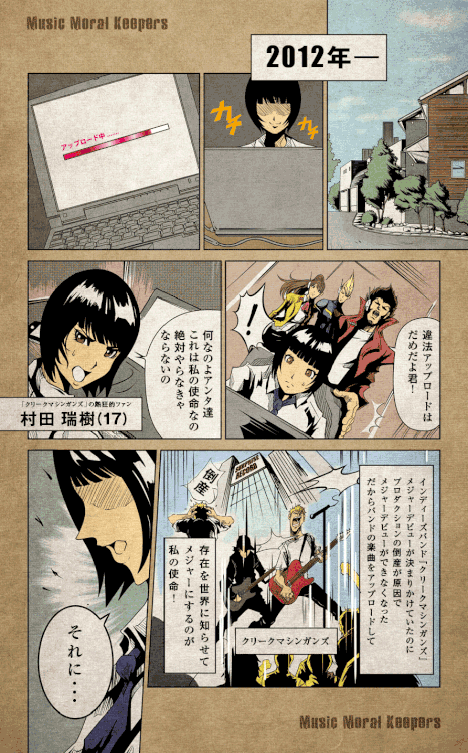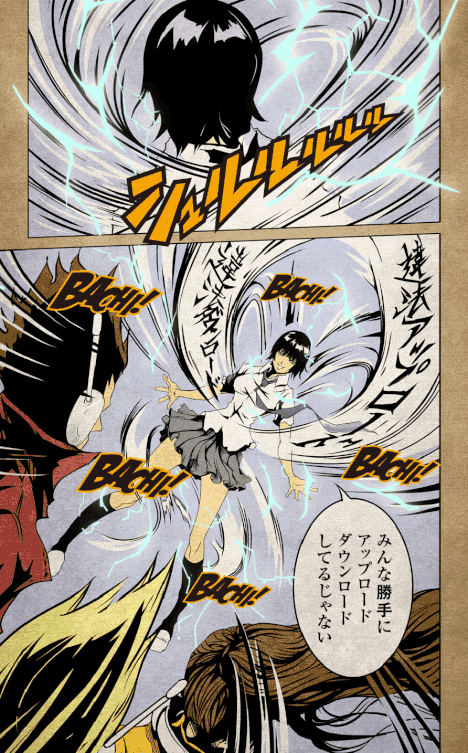Japan’s law banning unauthorised downloads or ripping of copyrighted material came into effect on the 1st of October, with a maximum prison sentence of 2 years awaiting the vast majority of Japan’s Internet users if they are unfortunate enough to be caught downloading music and videos.
Illegal downloads of music and videos now attract up to 2 years in prison and 2 million yen in fines. Previously such downloads were both a civil offence and a criminal offence with no actual penalty.
The law has already been widely criticised for being hugely vague and ambiguous as to what actually constitutes an offence – in the usual tradition of Japanese lawmaking (prostitution and obscenity laws being the most stunning examples), it seems the law will be sweeping and draconian on paper, allowing police plenty of leeway to pick and choose which parts they decide to enforce, whilst allowing them maximum freedom to crack down should they so wish.
Authorities do say illegally downloaded files which are cached will not be subject to prosecution, but the law itself contains only vague provisions (although it does exempt “unknowingly” downloaded material and material copied by way of “efficient data processing mechanisms”), apparently largely leaving the matter up to police and prosecutors.
Whether viewing an infringing movie on YouTube constitutes a crime is still undetermined – the movie would be downloaded and remain cached on the user’s PC, possibly constituting a crime, and the government has said it will not be prosecuting such offences.
They do however say viewing such videos is “undesirable,” none too subtly hinting that this may be a temporary exemption at best.
There is also vagueness as to how the law applies to anime and other TV broadcasts – it applies only to “paid” distribution, so freely aired TV broadcasts are said to be exempt.
However, videos distributed on DVD, or as PPV or paid downloads, are covered, and the government has stated that it has decided that all downloads of broadcasts which are later released in this form will become subject to the law, muddying the waters even further.
Oddly, the law seems to entirely omit certain categories of content, such as printed content (manga) and software – the bill’s creators apparently not having been paid off by these industries – instead concentrating exclusively on audiovisual recordings.
Unauthorised distribution (as opposed to downloading) of copyrighted material has been criminalised for some time, and is unaffected by the new law.
The other major aspect of the law has been to indiscriminately ban “ripping” – all format shifting of protected content is now a crime, in a much belated rerun of the original DMCA’s most criticised and dated element.
A side effect of the new law some critics have also mentioned is that now it is likely that, should they be so minded, police will be able to arrest virtually anyone whose PC they may happen to get a look at (as even those without any downloaded porn will surely have some YouTube videos or similar in their cache) – handily allowing them to ensure virtually any search of a suspect’s home or belongings results in an offence they can easily prosecute.
The most enthusiastic proponent of the law, which passed into law with barely any debate or opposition from lawmakers (only the communists bothered to oppose it), were Japan’s notorious record industry mafia bodies JASRAC and the RIAJ – they have been following through on their triumph by plastering schools with posters denouncing the scourge of free music, as part of a public awareness campaign centred on schoolchildren:
Although the music industry religiously believes its CD sales will skyrocket if it can only somehow ban the Internet, Japan’s anime industry in particular may be wondering whether the law will gut its free promotion machine – as even government studies have seemingly demonstrated, piracy appears to actually increase its sales.
Online there is the usual utterly ineffectual wailing and gnashing of teeth:
“It’s here!”
“Die pirates!”
“I’m reporting you all!”
“Let me just go and sell my PC.”
“I’m more bothered about them banning ripping completely.”
“So now they can basically arrest anyone.”
“They are just going to use this to arrest anyone they cannot get on the original charges.”
“If they actually enforced a law like this there would not be enough police.”
“The penalties are outrageously steep.”
“What will they do if sales do not increase? They were always blaming illegal downloads for everything.”
“They will just say even harsher laws are needed…”
“There is no way CD sales are going to increase because of this.”
“The ministry issuing statements as to how the law will actually be enforced has no actual ability to control what police and courts decide to do. In the end nobody knows how this will end up being applied.”
“Won’t this law only be a problem if copyright holders tattle on you to the cops?”
“It’s the type of crime which requires a complaint from the victim for police to prosecute, so if there is no report they may not be able to pursue an investigation [although they can ask the victim to prosecute if they catch someone in an unrelated search]. But that doesn’t mean they won’t try to make some examples.”
“They may as well just arrest the whole Internet.”
“Why don’t the bastards who wrote this law actually bother to explain it properly?”
“Great, now their sales will go through the roof! Japan’s content industries are saved!”









Japans not gonna run all the way here to arrest me.
f♥♥k you japan, come at me
The No more Heroes reference nearly went by me there.
Just because you rip doesn’t mean you pirate. Some people like mix tapes.
Gabe Newell once said that piracy was a service problem, So why don’t they offer an affordable service that everyone can enjoy? This has some pirates turning to steam, itunes, amazon digital downloads, and other legal means. I dont download music anymore, I stream it from youtube, pandora, iheartradio, and other streaming services. My games i have not bought any due to lack of job, and movies i have netflix.
Suddenly, everyone was arrested. Birth rates slow even more now that 1/4th of the Japanese population is incarcerated, then, everyone slowly dies.
The end.